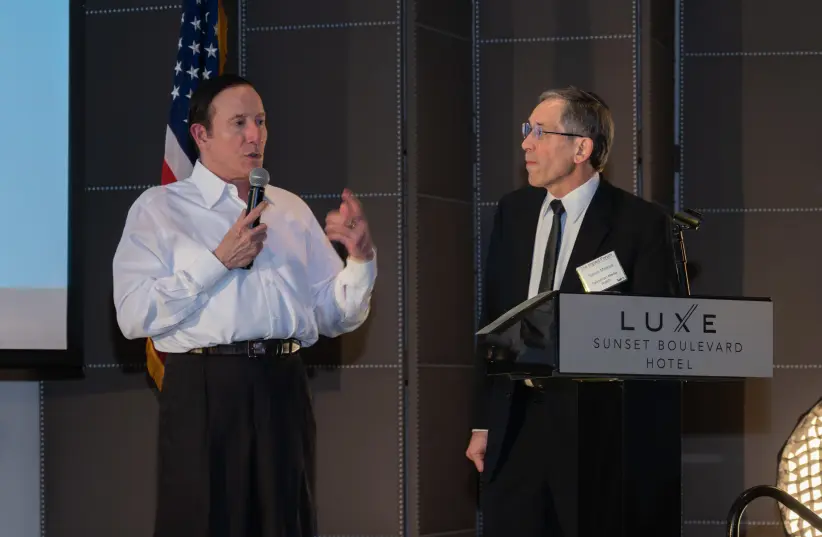This article was originally published in The Jerusalem Post on April 13th, 2023, written by Alan Rosenbaum.
Making an impact in fighting antisemitism and supporting Israel
‘There is no silver bullet,” says Adam Milstein, prominent Israeli-American businessman, philanthropist, and activist, speaking of organizations that combat antisemitism and stand against the enemies of Israel. “It takes a network of allied organizations to defeat the network of our detractors,” he adds.
The problem, Milstein explains, is that many of these pro-Israel nonprofit organizations are competing for funding with each other and have major redundancies but prefer to work independently so they can claim all the credit, and even claim credit for the work of other groups. As a result, he explains, there is little unity and coordinated effort among these groups, and donor funds are not being optimized.
Milstein, who has been supporting and working with many nonprofits for the past two decades, understands how organizations work and believes he has a way to enable them to work in synergy toward a common goal. “How do we bring them together?” he asks rhetorically. “We have to offer incentives.” One incentive would be to provide funding to organizations conditional on their collaborating and sharing information with other groups. Another way would be to provide certain capabilities that all groups can benefit from – like research services— and use these capabilities to spur collaboration among different groups.

LOS ANGELES-BASED philanthropists attending a recent Impact Forum Foundation dinner.
“Research organizations are very important in the world of fighting antisemitism,” says Milstein, “because they investigate antisemitic and anti-Israel organizations, their funding, their agenda and their current and future plans and provide the information to other groups which can then take action against them on multiple fronts. We can make a huge impact when we distribute this information to other organizations,” he explains. “Small organizations cannot conduct research and do not have funding for it; but providing them with this kind of service free of charge improves the quality of their work and enhances the impact they can make.”
With these ideas in mind, Milstein founded the Impact Forum Foundation, a community of like-minded philanthropists in Los Angeles and around the US that empowers a diversified network of organizations that support the State of Israel, fight antisemitism, and stand against the enemies of the US which, not surprisingly, he says, are the same.
“Antisemitism is first and foremost an American problem,” says Milstein. “My approach to fighting antisemitism is to build alliances with Americans who are fighting the internal and external enemies of America, which also happen to be the enemies of the Jewish people and the State of Israel. Combating antisemitism and strengthening Israel go hand in hand with fighting the enemies of the US.”
The Impact Forum offers participating organizations funding and services, such as communications services, strategic guidance and research material. “We bring philanthropists together, demonstrating the concept of creating a greater impact by encouraging many organizations to work together,” says Milstein. The Impact Forum Foundation provides funding to approximately 50 effective organizations, including media and social media organizations, think tanks, research and legal organizations and “boots on the ground” groups that are present in areas of conflict, such as college campuses.
Since 2017, the Impact Forum has hosted events in Los Angeles for groups as large as 120 philanthropists. At each event, two organizations present their work and organizational vision to those in attendance. Milstein says that an average of $200,000 was raised for each presenting organization at the most recent dinners held in Los Angeles.The Impact Forum Foundation brings prominent speakers to these events in order to attract interest and attendance among philanthropists who want to learn more about fighting antisemitism and supporting Israel. Previous speakers have included former Israeli ambassador to the US Michael Oren; author and speaker Daniel Gordis; former Soviet dissident Natan Sharansky; and New York Times columnist Brett Stephens.
Next month, the Impact Forum Foundation is holding its quarterly dinner in Los Angeles featuring several social media mega influencers who will discuss the vital role of media and social media in fighting antisemitism. The event will also feature presentations by two nonprofits, StopAntisemitism and Tazpit Press Service, which will be raising money to support their work. The keynote speaker, Dr. Sheila Nazarian, with over 1.7 million followers on Instagram alone, will be accompanied by TV personalities and digital media mega influencers Emily Austin, Nathaniel Buzolic, and Lizzy Savetsky for a panel discussion.
UPCOMING MAY Impact Forum Foundation event will feature mega-influencers discussing combating antisemitism through social media. (Credit: Impact Forum Foundation)
The events organized by the Impact Forum enable organizations to obtain additional funding and expand their work. One of the beneficiaries of the Impact Forum is Palestinian Media Watch, an Israel-based nonprofit research institute known for its in-depth research of Palestinian society from a broad range of perspectives.Arabic language researchers at Palestinian Media Watch monitor, translate and analyze PA-controlled newspapers, TV shows, radio programs, social media sites, and schoolbooks to understand the messages the Palestinian Authority and other Palestinian leaders send to their people.
Itamar Marcus, founder of Palestinian Media Watch, who presented at a recent Impact Forum event, pointed out that his organization, as a beneficiary of the Impact Forum, will share its information with other groups and said, “One of the goals of the Impact Forum Foundation is to strengthen contacts between different pro-Israel organizations and thereby to maximize coordination. Palestinian Media Watch, as a supplier of critical information to all Israel-supporting organizations, welcomes this coordination, as it will help maximize our impact in the US and internationally.”
He added that the fact that the Impact Forum connects philanthropists with important nonprofits that work toward a common goal not only benefits the organizations themselves but also benefits the philanthropists who are looking for ways to use their money wisely to fight antisemitism.
Milstein expands further on the benefits that accrue to donors and says, “They are usually familiar with a small number of organizations. We are vetting more than 50 effective organizations, active in different disciplines, thus complementing each other and giving the philanthropists the ability to make a personal impact by using their dollars where they can make the most impact.”
One example of how organizations that operate under the Impact Forum Foundation share and benefit each other, he notes, is that of CyberWell, the first open live database of antisemitic content that enables people to see the state of online antisemitism by interacting with the content and by using the organization’s visualization tools. CyberWell applies technology and open-source intelligence to monitor social media platforms for antisemitic content.
CyberWell’s findings were the foundation of a letter submitted jointly by 180 organizations worldwide to Elon Musk, owner of Twitter, substantiating the proliferation of antisemitic content on the platform and calling on Musk to update the company’s anti-hate policies and adopt the IHRA Working Definition of Antisemitism. This definition has been officially adopted by the US and 37 other national governments, as well as numerous local governments, universities, law enforcement agencies, civil society organizations, and international bodies worldwide, including the UN and the EU.
“This amazing network of 180 organizations signed and sent the same letter on the same day to Elon Musk and his senior management team at Twitter,” Milstein says. Speedy cooperation of this type among Jewish groups is unusual.
The Impact Forum Foundation is planning to expand its vision to other communities in the US where Jewish donors are serious about fighting antisemitism, including locations in Florida and New York. When the Impact Forum begins operations in other cities, he says, it will be able to add more organizations to its roster. In addition, says Milstein, the Impact Forum is creating a venture fund through which a group of 10 to 20 vetted and selected organizations will receive additional support and guidance on how to build effective collaborations with other organizations. For philanthropists, the venture fund is an extraordinary opportunity to support a group of several nonprofits through one donation.
The organizer, coordinator and catalyzer among all the organizations working with the Impact Forum Foundation is Milstein and his foundation team, who are working hand in hand with the Impact Forum board – a group of philanthropists who are devoted to the vision of empowering a diversified network of organizations that support the State of Israel, fight antisemitism and stand against the enemies of America.
Adam Milstein believes in thinking out of the box and using innovative techniques and strategies to fight our detractors. “We need to be extraordinary at what we are doing,” he says. “We need to continue expanding our work so we can increase our network of philanthropists and the number of organizations we are supporting.”He is certain that the Impact Forum’s work of getting organizations to work with one another and share information is paying dividends. “We are making these organizations 10 times better,” says Milstein. “Everyone wants to be better.”
This article was written in cooperation with the Impact Forum Foundation.
For more information about the Impact Forum and to register for the May 11 event, contact: [email protected]


